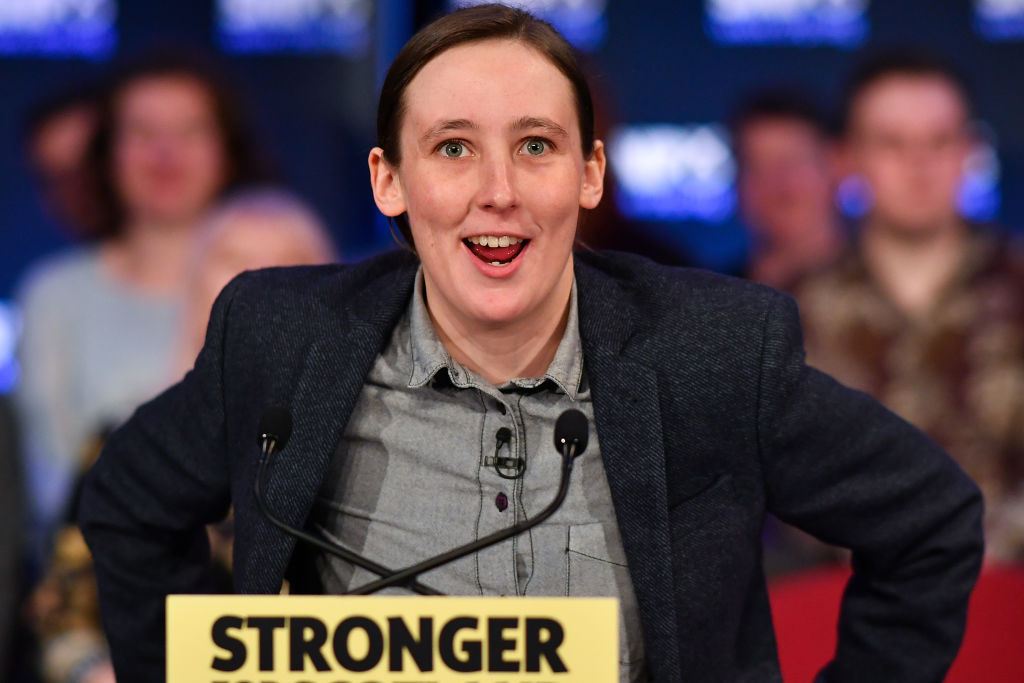When 20-year old Mhairi Black was elected in 2015, she became the youngest MP for over 300 years. Eight years later, it seems that the ‘baby of the house’ has yet to grow up. Speaking at the Edinburgh Fringe Festival, Black has likened gender critical campaigners to white supremacists, and suggested that they were funded by ‘fundamental Christian groups in America, Baptist groups [and] anti-abortion organisations.’
It’s doubtful whether Black reached even the ad hominem level of debate as she dismissed those who disagreed with her in the febrile row over transgender rights. When asked if she believe that someone with a different philosophical view to her could still be ‘a thoroughly decent person’, Black replied, ‘If you keep it to yourself, aye.’
Name calling and silencing are the tools of the playground bully. But as she laid into those she dismissed as ‘bad actors’ and ‘50-year-old Karens’, what came over to me was a total lack of self-awareness. Trans people should be left ‘the hell alone’, Black declared. I wish you – and your party – had had done just that, Mhairi. Instead, you made a political football out of us.
Back in 2015, trans rights were hardly on the political agenda. The Equality Act, passed five years earlier, made it unlawful to treat transsexual people less favourably in things like employment, housing and the provision of goods and services. We also enjoyed specific protection from hate crime – though the UK was hardly a hotbed of transphobia – while the Gender Recognition Act allowed transsexuals with a diagnosis of gender dysphoria to change the sex marked on our birth certificates. Few had invoked that right – in my case because I had no need to lie about the past in order to live in the present. I suspect that I am far from unique in that respect.
But the SNP cared little about that when it seized on self-identification of legal gender as the way forward for Scotland. The only people who got much of a hearing were those who told the party exactly what it wanted to hear – that Scotland could allow transgender-identified males to self-identify their way into women’s spaces, women associations and even women’s prisons, and all would be well. The party didn’t care what rational and sensible people had to say.
Many warned them, including For Women Scotland and the Edinburgh-based policy analysis collective, Murray Blackburn Mackenzie, but their pleas fell on deaf ears. In a final display of hubris, the SNP even ignored Reem Alsalem – the United Nations Special Rapporteur on violence against Women and Girls – when she pointed out that, ‘the ongoing efforts to reform existing legislation by the Scottish government do not sufficiently take into consideration the specific needs of women and girls in all their diversity, particularly those at risk of male violence.’
We all know what happened next – a violent male rapist ended up in a women’s prison, and Nicola Sturgeon resigned as First Minister. Yes, there were far more problems facing the SNP than its ill-fated Gender Recognition Reform Bill, but the party was left looking ridiculous. As the principle of self-ID unravelled, Humza Yousaf argued that the rapist – Isla Bryson – was merely ‘at it’ and ‘not a genuine trans woman’.
Grown-up politicians might have learned from observing that humiliating experience. Not so Mhairi Black. Back to the present, she argues that the only place where sex, not gender, should matter is in a medical setting. Fiddlesticks! Maybe she could elaborate on the implications of such naïve thinking to women athletes who worry about men self-identifying their way into female sport, or children who want to uphold their right to single-sex toilets and changing facilities in schools.
Instead, she opined that, ‘Being trans is not something to be feared. It’s just an aspect of a human being.’ Once again, Black totally misses the point. The truth is that being trans does not change anyone’s sex, and when sex matters, everyone’s rights matter. When Black said that trans people should not be made into an intellectual debate, I wondered how much inkling she has about the need for intellectual debate on such profound changes to policy. Maybe she simply does not understand that safeguarding weaknesses will be a magnet to anyone looking to exploit the rules?
Black had already announced that she is stepping down at the next election. It will not be a moment too soon.







Comments